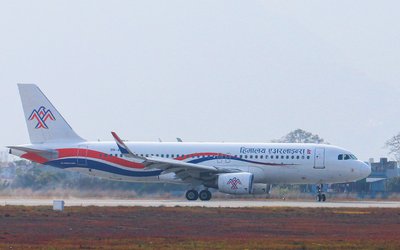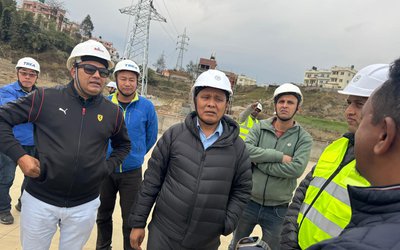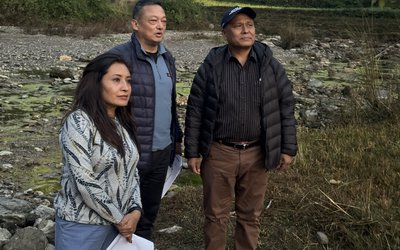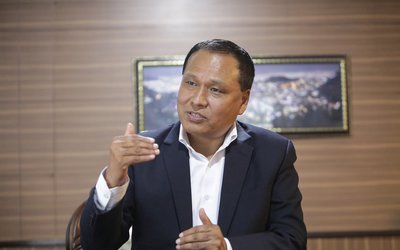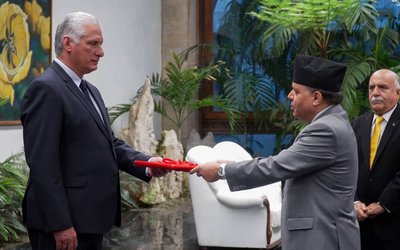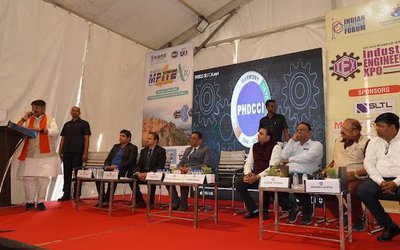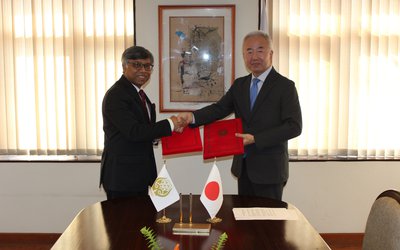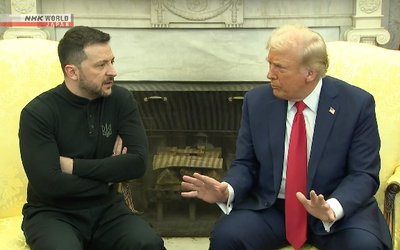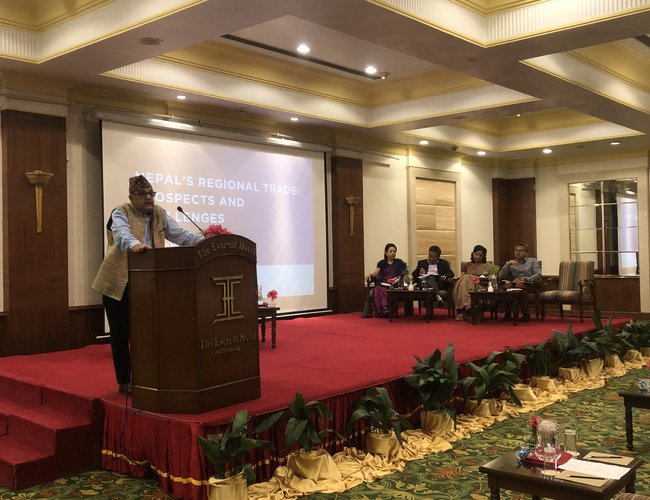
Despite tremendous potential, Nepal has failed to fully capitalize on its export opportunities within its immediate neighborhood due to its limitations in production capacity and supply-side issues as well as various tariff, non-tariff and para-tariff barriers imposed by the destination countries.
Experts emphasized the need to address these challenges in order to boost regional trade—be it merchandize, service or electricity—during a discussion held today by South Asia Watch on Trade, Economics and Environment (SAWTEE). The discussion programme titled “Nepal’s regional trade: Prospects and challenges” was part of the seminar on Small State Capabilities: Navigating Competition and Foreign Policy Priorities in Nepal, led by the Asia Foundation (TAF).
The deliberation mostly concentrated on Nepal’s trade with Bangladesh and India and the prospects of diversifying existing merchandise trade into electricity trade as well. Nepal's heavy reliance on India for its exports and trade is evident, while its trade activities with countries beyond India remain lackluster. A study conducted by SAWTEE on Nepal-Bangladesh trade has found that Nepal's exports to Bangladesh have mainly centered on agricultural products, with lentils making up approximately 90 percent of exports over the past five years.
As Nepal moves closer to graduating from the Least Developed Country (LDC) status, it becomes crucial to explore alternative markets to mitigate the impact of tariff increment in some of its major trade destinations. In this context, there exists substantial potential to strengthen bilateral trade ties with Bangladesh, Mr. Kshitiz Dahal, Senior Research Officer, SAWTEE, pointed out during his presentation.
He argued that while non-tariff barriers do exist, it is the tariff/para-tariff barriers that constrain Nepal’s export to Bangladesh. Mr. Dahal, the author of the report, said that a Preferential Trade Agreement (PFA) could remove this constraint but there are various challenges to successfully conducting a PTA.

Rabi Shanker Sainju, Former Joint Secretary, Ministry of Industry, Commerce and Industry, Government of Nepal, pointed out that the time to trade with China via the land route is much lower than via the sea route for which he recommended that the constraints to utilizing the land route be addressed. Furthermore, he emphasized that despite the close geographical proximity, the trade costs between Nepal and its neighbouring countries are high. The high trade cost remains a barrier for Nepal even though there is substantial market potential in these countries, he added.
With regard to the prospect of electricity export from Nepal to India and Bangladesh, Dipak Gyawali, Former Minister for Water Resources, pointed out that rather than direct export of electricity, Nepal is better off exporting goods by using electricity to power its own factories. He pointed out the growing regulatory barriers imposed by India on electricity purchase from Nepal, as well as, Nepal’s higher cost of generation do not make electricity export conducive.
Dr. Durgesh Man Singh, Former Member, National Planning Commission and Former Ambassador to India, highlighted that initiatives at the highest political level between Nepal and India during the 1990s saw bilateral trade and investment flourish in a meaningful manner. He suggested that stakeholder consultations between the central government of Nepal and Bangladesh should be mobilized to enhance trade and investment.
Bhawani Rana, Former President, Federation of Nepalese Chambers of Commerce and Industry (FNCCI), called attention to shrinking Indian investment in Nepal. She urged that it’s a high time that Nepal tapped into the huge market in the bordering states of India. According to Ms. Rana, despite huge potential for trade, Nepal’s exports to China are impeded due to infrastructure and logistics constraints. She recommended a coordinated effort from the private sector, government agencies, policymakers, and political parties to enhance trade and exports.
Neeru Rayamajhi Khatri, President, Federation of Woman Entrepreneurs’ Association of Nepal (FWEAN), said that there are high-value with huge export potential produced by women entrepreneurs mostly engaged in MSMEs comprising agro-forestry-based products including pickles, snacks, handicrafts, felt, paper, textiles, pashmina, rudraksha, among others. She suggested that proactive actions from Nepali diplomatic missions are needed to promote Nepali products in the region.
Satish Joshi, Director, VRock and Company Pvt. Ltd., expressed the inevitability of trade in electricity for Nepal, taking into account the climate and environmental perspectives and said that Nepal will have a surplus even after meeting its own demands.
The event saw the participation of around five dozen participants, including trade
- Prithvi Bahadur Pande has been unanimously elected as the Chairman of Nepal Investment Mega Bank
- Mar 04, 2025
- Global IME Bank To Organize Hackathon
- Mar 04, 2025
- Ambassador Paudyal Presents Letters of Credence to the President of Cuba
- Mar 04, 2025
- Himalaya Airlines To Operate A Weekly Flight To Connect Pokhara With Lhasa
- Mar 04, 2025
- Six substations under construction, 20 more to improve power supply in Kathmandu Valley will be built
- Mar 04, 2025


